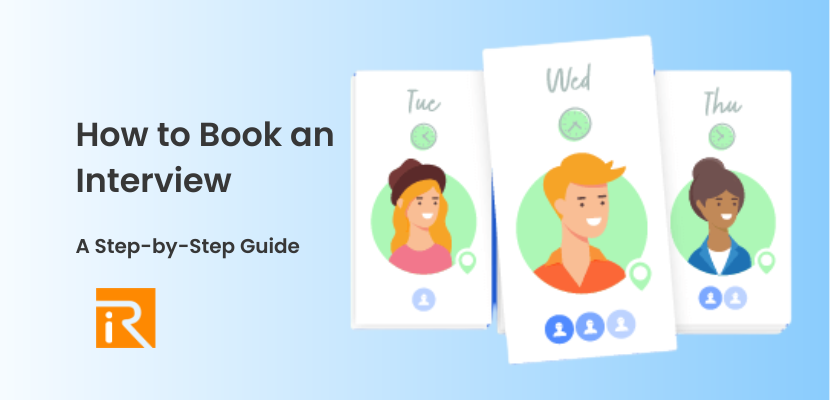Booking an interview can be daunting, but it’s an essential step in the job search process. It’s the opportunity for you to showcase your skills and personality and stand out from other candidates. It’s important to prepare for an interview and make a great first impression.
In this article, we will guide you through a step-by-step process on how to book an interview. We will also answer some of the most common questions people have regarding this topic.
How to Book an Interview: Step-by-Step Guide
Booking an interview can be done in a few simple steps. Let’s go through each step one by one.
Step 1: Research the Company
Before you book an interview, it’s important to do your research on the company you’re applying to. You need to know about their culture, values, and the job description they have posted. This information will help you determine if the job is a good fit for you, and it will also help you prepare for the interview.
Step 2: Prepare Your Resume and Cover Letter
The next step is to prepare your resume and cover letter. These documents are important as they are the first impression the employer will have of you. Your resume and cover letter need to be tailored to the job you are applying for, highlighting your relevant skills and experiences.
Step 3: Submit Your Application
After preparing your documents, the next step is to submit your application. This can be done through the company’s website, email, or by dropping off a physical copy at their office. Make sure to follow the company’s application guidelines carefully.
Step 4: Follow Up
Once you’ve submitted your application, it’s important to follow up. This shows the employer that you are interested in the position and are willing to take the initiative. You can follow up with an email or phone call after a week or two of submitting your application.
Step 5: Book the Interview
After following up, the employer will schedule an interview with you if they think you’re a good fit for the job. The interview can be done in-person or over the phone, depending on the company’s preference. You will be given a date and time for the interview.
Step 6: Prepare for the Interview
The final step is to prepare for the interview. Research the company further and prepare answers to common interview questions. Dress appropriately and make sure to arrive on time for the interview.
How to Schedule an Interview at the Best Time
Scheduling an interview at the right time is crucial. Here’s how to do it:
Step 1: Understand Your Availability
Before scheduling the interview, you need to determine your availability. It’s important to consider your work schedule, personal commitments, and any other obligations that may interfere with the interview. Once you have a clear idea of your availability, you can start looking for the best time to schedule the interview.
Step 2: Consider the Company’s Availability
It’s also essential to consider the company’s availability when scheduling an interview. Find out if the company has specific interview times or if they’re flexible. Most companies will work with you to find a time that works for both parties.
Step 3: Avoid Scheduling During Rush Hour
It’s best to avoid scheduling interviews during rush hour. Rush hour traffic can cause delays and make you arrive late for your interview. It’s also essential to consider the time of day when scheduling your interview. Many interviewers prefer to schedule interviews in the morning, when they’re fresh and alert.
Step 4: Check Your Schedule Again
Before confirming the interview time, double-check your schedule to ensure that you’re available. It’s also essential to confirm the date and time with the interviewer to avoid any misunderstandings.
Step 5: Respond to the Interviewer Promptly
When the interviewer offers you a time for the interview, respond promptly. If you’re not available at the proposed time, let them know and offer alternative times that work for you.
Step 6: Be Mindful of Time Zones
If you’re scheduling an interview with a company in a different time zone, be mindful of the time difference. Use a time zone converter to ensure that you’re scheduling the interview at a time that works for both parties.
Step 7: Understand Scheduling Etiquette
Understanding scheduling etiquette is crucial when scheduling an interview. Don’t be too pushy or demanding when suggesting alternative times. Be respectful of the interviewer’s time, and show up on time for the interview.
The 10 Tips to Successfully Booking First Interviews with Dream Candidates
Write Compelling Job Descriptions
The first step in attracting dream candidates is to write compelling job descriptions that clearly outline the job requirements, responsibilities, and expectations. Use language that is exciting and engaging and highlights what makes your company unique. Avoid generic language and buzzwords, and focus on the essential skills and experience required for the role.
Use Social Media to Promote Job Postings
Social media platforms like LinkedIn, Twitter, and Facebook can be effective tools for promoting job postings and reaching a broader audience. Share your job postings on social media and encourage employees to do the same. Consider using social media advertising to target specific job seekers who may be a good fit for the role.
Use an Applicant Tracking System
An applicant tracking system (ATS) can help streamline the hiring process and make it easier to track and manage job applications. An ATS can automatically screen resumes, organize applications, and schedule interviews, saving time and effort for recruiters and hiring managers.
Personalize Your Approach
Candidates want to feel like they are more than just a number in the hiring process. Personalize your approach by addressing candidates by name, referencing their experience or qualifications, and highlighting why you think they would be a good fit for the role.
Move Quickly
Top candidates are in high demand, and they won’t be on the job market for long. Move quickly to schedule interviews and make hiring decisions. Delaying the process can result in losing out on top talent to other companies.
Schedule Interviews During Non-Traditional Times
Consider scheduling interviews outside of traditional office hours to accommodate candidates’ schedules. This can include early morning or late evening interviews or even weekend interviews. This can make it easier for candidates who are currently employed to attend interviews without disrupting their work schedule.
Be Transparent About the Hiring Process
Be open and transparent about the hiring process, including the number of interviews, the timeline, and the decision-making process. This can help alleviate candidates’ anxiety and make them more comfortable throughout the process.
Provide a Clear Job Description and Salary Range
Candidates want to know what they’re applying for and what they can expect in terms of compensation. Provide a clear job description and salary.
Make the Candidate Feel Valued
Making the candidate feel valued and appreciated can go a long way in attracting and retaining top talent. Be courteous and respectful during the hiring process, and make sure to communicate frequently and promptly. Small gestures, like sending a thank you note or providing feedback after the interview, can leave a positive impression on candidates.
Follow Up Promptly
Following up promptly after the interview can show candidates that you are interested and serious about hiring them. Send a thank you email or note within 24 hours of the interview, and provide a timeline for when they can expect to hear back from you. If you decide not to move forward with a candidate, be sure to let them know as soon as possible, so they can continue their job search.
How to Write an Interview Scheduling Email
When it comes to writing an interview scheduling email, there are a few essential elements you should include to make sure that your message is clear and concise. Here are some tips on how to write an interview scheduling email:
Use a Clear Subject Line
The subject line of your email is the first thing that the candidate will see, so it’s crucial to make it clear and informative. Use a subject line that clearly indicates the purpose of the email, such as “Interview Invitation for [Position] at [Company Name]” or “Schedule Interview for [Position] at [Company Name].”
Start with a Professional Greeting
When addressing the candidate in your email, make sure to use a professional greeting such as “Dear [Candidate’s Name]” or “Hello [Candidate’s Name].” Avoid using informal greetings such as “Hi” or “Hey” as they can come across as unprofessional.
Provide a Brief Introduction
In the opening paragraph of your email, provide a brief introduction to yourself and your company. Mention the position that the candidate has applied for and express your appreciation for their interest in the role.
Offer a Few Options for Interview Times
When suggesting interview times, offer a few different options to accommodate the candidate’s schedule. Include both dates and times, and make sure to specify the time zone if you are in a different location.
Provide Clear Instructions
Make sure to include clear instructions on how the candidate can confirm their interview time. Provide a deadline for confirmation and specify the method they should use to confirm, such as replying to the email or using an online scheduling tool.
Close with a Polite Ending
In the closing paragraph of your email, thank the candidate for their time and express your enthusiasm for meeting them. Provide your contact information, including your email and phone number, and encourage the candidate to contact you if they have any questions or concerns.
Conclusion
Booking an interview may seem daunting, but with the right preparation, it can be a smooth process. Research the company, prepare your documents, submit your application, follow up, and prepare for the interview. By following these steps, you’ll be on your way to landing your dream job.
FAQs
How do I follow up after submitting my application?
You can follow up with an email or phone call after a week or two of submitting your application. Be polite and professional when following up, and remind the employer of your interest in the position.
How long should I wait before following up?
You should wait about a week or two before following up after submitting your application. This gives the employer enough time to review your application and consider your candidacy.
What should I wear to the interview?
It’s important to dress professionally for the interview. Wear business attire, such as a suit or dress pants and a blouse. Make sure your clothes are clean and ironed.
Should I bring anything to the interview?
You should bring a copy of your resume and cover letter, as well as a notepad and pen to take notes. You can also bring a portfolio of your work if it’s relevant to the job.
How do I prepare for common interview questions?
Research common interview questions online and prepare answers ahead of time. Practice your responses with a friend or family member to help you feel more comfortable during the interview.
How do I thank the interviewer after the interview?
After the interview, it’s important to thank the interviewer for their time and consideration. You can send a thank-you email or letter within 24 hours of the interview. This shows the employer that you appreciate their time and are still interested in the position.
Should I be flexible with interview scheduling?
Yes, it’s important to be flexible and accommodating to the candidate’s schedule as much as possible.
How can I make sure the candidate confirms the interview time?
Ask the candidate to confirm the interview time in their response, and include a reminder of the interview time and location in the confirmation email.

















